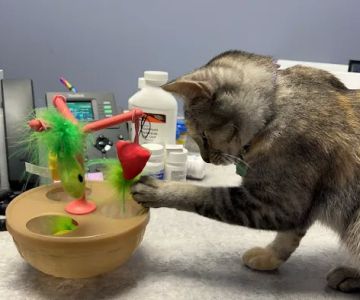The Nutritional Needs of Exotic Pets: A Complete Guide
As a pet owner, I know how rewarding it can be to care for an exotic pet. Whether it's a reptile, bird, or small mammal, these animals often require specialized care that goes beyond the basics of pet ownership. One of the most important aspects of caring for exotic pets is understanding their nutritional needs. I’ve had my fair share of learning moments when it comes to feeding my exotic animals, and I'm excited to share what I’ve learned about keeping them healthy through proper nutrition.
1. Why Nutrition is Crucial for Exotic Pets
Exotic pets have specific nutritional requirements that differ from those of traditional pets like dogs and cats. As I’ve come to realize, understanding the dietary needs of exotic pets is crucial for their health and well-being. Unlike cats and dogs, exotic pets often come from varied environments where their food sources are vastly different from what we might offer them. Without the proper nutrients, exotic pets can experience health issues such as malnutrition, obesity, and even early death.
1.1 Unique Dietary Requirements
What makes exotic pets different from traditional pets is that many of them are herbivores, omnivores, or even insectivores. This means they need specific diets that include certain types of food, like plants, insects, or small vertebrates. For example, my pet iguana thrives on a diet rich in leafy greens, while my pet hedgehog enjoys a mix of insects and specially formulated food. Understanding these unique dietary needs is the first step in providing a healthy and fulfilling life for your exotic pet.
2. Feeding Reptiles: A Closer Look at Herbivores and Carnivores
Reptiles, such as turtles, lizards, and snakes, are among the most common exotic pets. What I’ve learned through owning a few reptiles is that their nutritional needs can vary greatly depending on their species. Herbivorous reptiles, such as iguanas, need a diet primarily composed of leafy greens, while carnivorous reptiles like certain species of snakes need a diet of rodents or fish.
2.1 Herbivorous Reptiles
Herbivorous reptiles typically require a diet rich in fiber, which helps with digestion and overall health. My iguana, for instance, enjoys leafy greens such as kale, collard greens, and dandelion greens. Additionally, offering a variety of vegetables ensures that they receive the necessary vitamins and minerals. I’ve found that a combination of different greens, with the occasional fruit treat, works wonders for my reptile’s digestive system.
2.2 Carnivorous Reptiles
For carnivorous reptiles like my pet snake, the dietary needs are different. They require a protein-packed diet made up of live prey or frozen rodents, depending on the species. It’s important to ensure that the food is appropriately sized and nutritionally balanced. I’ve learned that feeding snakes too much or too little can lead to health issues, so proper portion control is essential for maintaining their health.
3. Birds and Their Dietary Needs
When it comes to birds, I have always been fascinated by how specific their diet can be. Unlike reptiles, birds are often omnivorous and may need a mix of seeds, fruits, and vegetables to stay healthy. Over the years, I’ve come to understand that variety is key to a bird’s diet. For example, my parakeet loves sunflower seeds but also enjoys fresh fruit like apples and berries. Offering a balanced mix of food helps prevent obesity and ensures that your bird gets the necessary nutrients.
3.1 Seed Mix vs. Fresh Foods
One mistake I made early on was relying too heavily on seed mixes for my bird's diet. While seeds can be a good source of energy, they often lack the necessary vitamins and minerals birds need. Fresh fruits, vegetables, and specially formulated bird pellets are essential for providing a balanced diet. For instance, my parrot benefits from fresh leafy greens like spinach, alongside some fruit like bananas and oranges.
4. Nutritional Needs of Small Mammals
Small mammals, such as guinea pigs, rabbits, and hamsters, have their own specific dietary needs. I’ve owned a few guinea pigs, and I learned that their diets should be high in fiber and vitamin C. Guinea pigs cannot produce their own vitamin C, so it's crucial to provide them with foods that are rich in this vitamin, such as bell peppers and leafy greens.
4.1 Hay and Fresh Veggies for Rabbits
Rabbits, another common exotic pet, thrive on a diet rich in hay, particularly timothy hay. I learned that hay helps with digestion and keeps their teeth healthy by naturally wearing them down. Alongside hay, fresh vegetables such as carrots, kale, and parsley are essential for providing a variety of nutrients. I've noticed that my rabbit is much healthier when I maintain a consistent diet of high-fiber hay and fresh produce.
4.2 Pellets for Hamsters and Guinea Pigs
For hamsters and guinea pigs, pellets designed specifically for their dietary needs are important. These pellets are formulated to provide essential nutrients, including vitamins, minerals, and fiber. However, it’s equally important to supplement their diet with fresh fruits and vegetables. My guinea pig, for example, enjoys a combination of pellets and fresh cucumber slices for hydration.
5. Supplements and Additional Nutritional Tips
While providing a balanced diet for your exotic pet is essential, sometimes additional supplements may be necessary. I’ve learned that reptiles, for example, may need calcium and vitamin D3 supplements, especially if they are not exposed to enough natural sunlight. For birds, a small amount of cuttlebone can help with calcium intake, which is essential for strong bones and overall health. I always recommend checking with a veterinarian specializing in exotic pets before adding supplements to ensure they’re necessary and safe for your pet.
5.1 Proper Portion Control
Overfeeding is another common mistake I’ve made in the past, especially with small mammals and birds. It’s easy to assume that more food equals better health, but portion control is essential for maintaining a healthy weight. I've found that measuring out food and offering it in small, controlled portions helps prevent obesity and other health issues.











